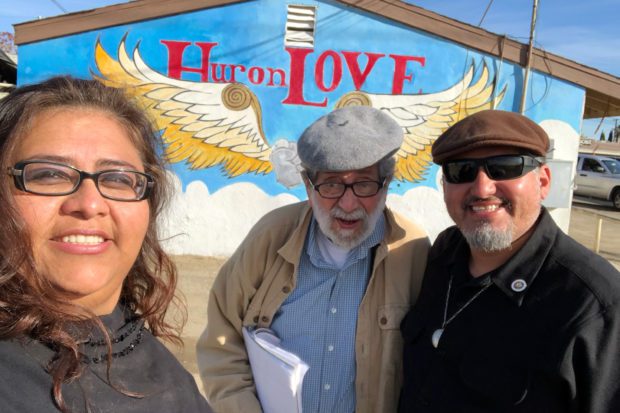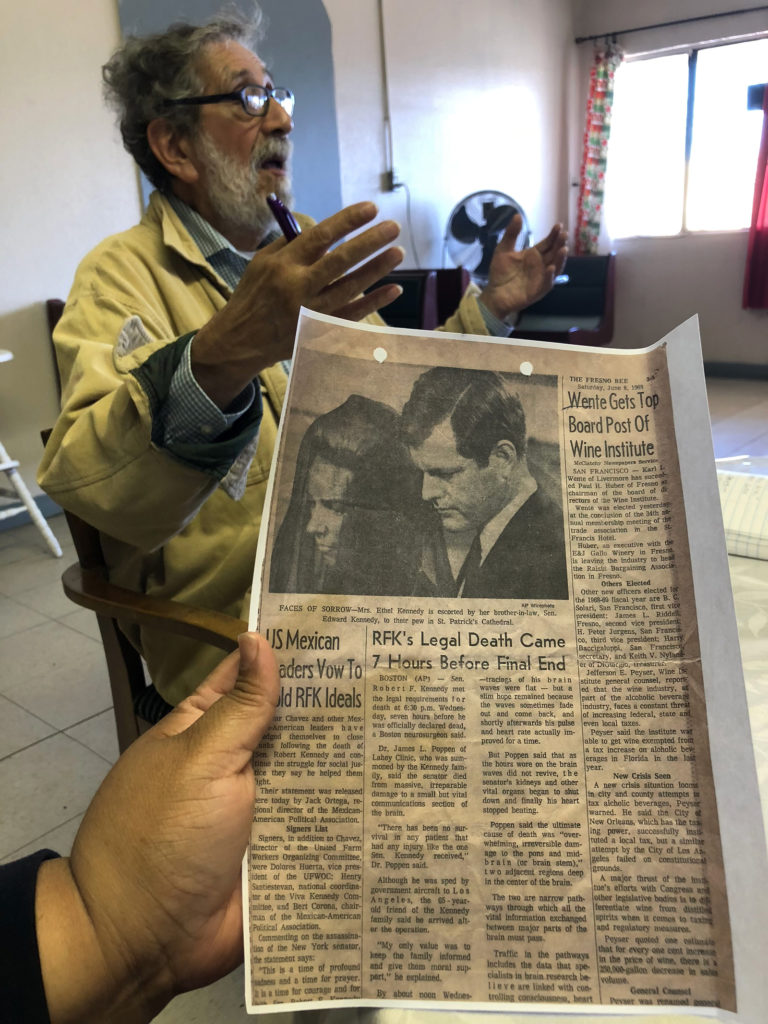

Jack Ortega was born in Los Angeles on Dec. 7, 1929. He graduated from St. Joseph’s Catholic High School in Alameda and went into the U.S. Army, serving in the Korean War as an artillery observer. After his military service, and long before the birth of the Chicano movement, Ortega began a life of community work, supporting causes in predominantly poor, Spanish-speaking and working-class communities. He would join the stream of Chicano consciousness and activism that began after World War II, when Mexican American veterans decided to fight for “their place at the table.”
This coalesced around the G.I. Forum, which was founded in 1945, and later, the Community Services Organization (CSO) headed by Edward Roybal in 1947. A Mexican labor activist, Bert Corona, led the CSO in Oakland, Herman Gallegos in San Francisco, a then unknown Cesar Chavez began organizing in San Jose and Hector Abeytia in Fresno County.
Ortega was eventually hired by Alameda County Legal Services where he met the famed “Brown Buffalo,” attorney Oscar Zeta Acosta, of the Mexican American Legal Defense Fund. It was during the 1960s’ awakening of “the sleeping giant” that Ortega encountered, or perhaps was discovered by, Corona, and Armando Rodriguez of Fresno, and they would become his lifelong friends.
Also, during that time Ortega, Corona and Rodriguez came together with leaders of the G.I. Forum and the CSO and concluded that the Democratic Party was not representing or promoting Latinos. In 1960, they met in Fresno and founded the Mexican American Political Association (MAPA) and elected Roybal as the first president; he would go on to be the first Latino elected to Congress since the early days of California. Dolores Huerta and Gallegos coordinated the Viva Kennedy campaign in California and, in 1960, John F. Kennedy would be elected President of the United States.
The Fresno MAPA became the largest and most active chapter in the San Joaquin Valley and brought together formidable community leaders, including Armando Rodriguez and Bettie Rodriguez, Theresa Perez, Maria Rodriguez, Esteban Santos, David Arredondo, Angie Cisneros, Jess Quintero, Frank Quintana, Albert Ramirez, Josie Mena, David and Dollie Arredondo, Sal Salcedo, Al Molina, Maria Hurtado and Julia Balderas to name a few.
Ortega was always at the center of activities or hustling between Fresno and Sacramento. By 1964, he and Abeytia had organized MAPA chapters in Madera, Firebaugh, Hanford, Visalia, Sanger, Reedley, Porterville, Hollister, Modesto and Watsonville. Civil rights lawyer Cruz Reynoso organized MAPA in Imperial County, and MAPA won elections in Selma, Sanger and Mendota.
In 1966, they teamed up to help Jim Lorenz and Gary Bellow launch California Rural Legal Assistance. Cruz Reynoso would become the director and Armando Rodriguez would open the Madera office.
In 1968, Corona introduced Ortega to Bobby Kennedy. During the uncertain days of the early primaries, Ortega was sent to Indiana “with a bag of clothes and a box of Viva Kennedy stickers” to mobilize the Latino vote. He organized a rally in a large basketball auditorium, and when Kennedy arrived, he was mobbed by throngs of Mexican Americans and Latinos in one of the largest shows of support of the campaign.
On June 6, 1968, Chavez, Huerta and Corona were getting out the vote in the Los Angeles barrios. Ortega was back home in Fresno and watched Kennedy on television as he delivered his victory speech. Ortega would never forget the deep sadness he felt when Robert Kennedy and the hopes and dreams of the Latino community were struck down by an assassin’s bullet.
But MAPA remained undeterred in fulfilling its main mission of political empowerment through voter registration, candidate development and getting out the vote. MAPA was instrumental in electing Al Villa to the Fresno City Council and Bob Arroyo to the Fresno Unified School District board. Reynoso would eventually rise to associate justice of the Supreme Court of California, and Armando Rodriguez would become a Fresno County supervisor and then a Superior Court Judge. For many years, Ortega pioneered as the only lobbyist for Chicano candidates and causes in Sacramento out of his headquarters, known as the “Brown House.”
Throughout his life, Ortega was involved in all kinds of issues and actions, such as the strikes at the Partex auto parts assembly plant in southeast Fresno and the Livingston Foster Farms poultry plant. Foster Farms would subsequently be organized by the United Food and Commercial Workers and in later years by the United Farm Workers. Ortega was always calculating, planning and organizing.
Between 1970 and 1980, Ortega engaged in economic development on the Mexican border. He was the project director for the 60-acre Calexico Industrial Park. The development would provide business opportunities and jobs to residents of Calexico and the surrounding communities for many years to come.
It is a challenge to characterize Ortega or tell his story: He never ran for political office or sought notoriety for his achievements. And his achievements and the relationships that he built were far too many to capture in this statement. It is sufficient to say that his life was part of the story of California: a dialectical relationship with history and the environment of racism, reaction and social progress.
Later in life, Ortega would continue his work in the Canal District of San Rafael for another 40 years where he organized day laborers from Mexico and Central America. In 2017, Ortega and his spouse, Maria, returned to Fresno where he would celebrate his 93rd birthday in 2022. He continued to appear at meetings of elected bodies, forums and protests.
Ortega’s journey was one of constant struggle and the sacrifice of his time and life energy in the service of poor and working-class communities. Everywhere he went, he challenged the power structure with compassion and strategic thinking to lift the people. He mentored and developed hundreds of individuals who would go on to become leaders, providing a multiplier effect beyond the capacity of many of the men and women of his time.
In his last days, Maria recalls hearing him on numerous occasions repeat, “Tiger, tiger, burning bright, in the forests of the night…” Ortega has gone with the other giants of his times to join the ancestors. But his light will shine, guiding the way, for many generations to come.
